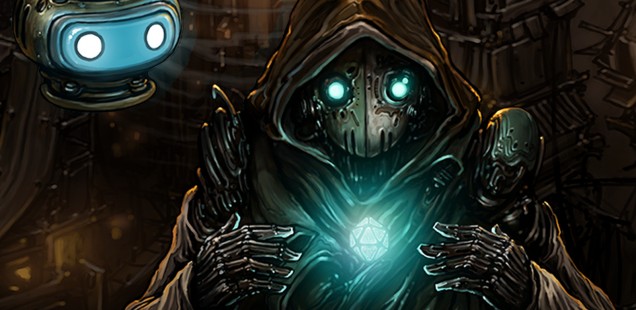
Off The Grid: Disordia
Zachary Brictson greases the rusty machinery of Primordia.
When booting up Primordia for the first time I couldn’t help but awkwardly fondle my own face to make sure my glasses were on, just to confirm that, yes, it’s the game that’s blurry. The pixelated palette of brown and dusty orange takes some getting used to, but the hazy smear actually does the setting good justice, complementing a post human world of machinery and grease.
What may catch you more off guard is just how human that world really is. The two robot protagonists of this point and click adventure, the engineering droid Horatio and his pieced-together companion Crispin, seem as capable as any person in expressing the full emotional spectrum of the English language.
They call a piece of wreckage their home, located in a desert turned junkyard where Horatio scours for tools. To build is his raison d’etre, passed down to him by the now extinct Man, the original and ‘perfect’ builders of the world. Man made Horatio to be resourceful, and Horatio made his buddy Crispin to be, well, obnoxious.
But as you scan each environment for objects, clues and information, Crispin’s sarcastic chiding of your decisions does lighten the frustration of the trial and error process. Paired with Horatio’s matter-of-fact tone of inner monologue, Primordia guides the player to answers and away from dead-ends, while successfully characterizing the two machines. Hover the cursor over a pile of junk and Horatio will soberly deny any practical use of it, while Crispin may shoot back “Gee, boss, maybe if you built me some arms!” should you ask him to perform a task outside his limits.
The problem solving still manages to be annoyingly roundabout, requiring a lot of backtracking to see which objects interact with each other. From using a blowtorch to cut a long piece of cable, to placing a bomb in a puddle of grease to create a sticky explosive, uncanny solutions can leave you resorting to random guesswork, and later feeling a bit betrayed. Doubly so if you happened to fail spotting something hidden in the out-of-focus visuals.
Matching objects in the desert gives way to various logic problems once you reach the corrupted city of Metropol. You’ll barter, argue and confront crazy robot townies like one that seems programmed to riddle at you in hilarious rhymes. A stoic droid from the boonies, it’s easy to sympathize with Horatio in this harrowing dilemma, but loses its touch as his humble quest uncovers a more grand conspiracy. The puzzles leading to this reveal resort to asinine trickery with numbers and text and to NPCs with overwhelming amounts of droning, robotic dialogue stuffed with all the answers to the city’s mysteries.
Instead of giving you the other half of Metropol to explore, Primordia hastily rushes towards an ending that decides the fate of a city you hardly understand. It’s desire to be an epic adventure is too sudden and ambitious, leaving its personable character dynamics and somber scenery in the dust for quick, shallow access to drama. If this software could talk to its creators like Crispin does to Horatio, I imagine it would take on a very similar tone. Endearing, but ungrateful.
Zachary Brictson is a Computer Science graduate from Northern Illinois University who chooses to write about games rather than code them, contributing to physical publications like The Printed Blog, sites such as Playstation Universe, and his own blog, Up Magic.